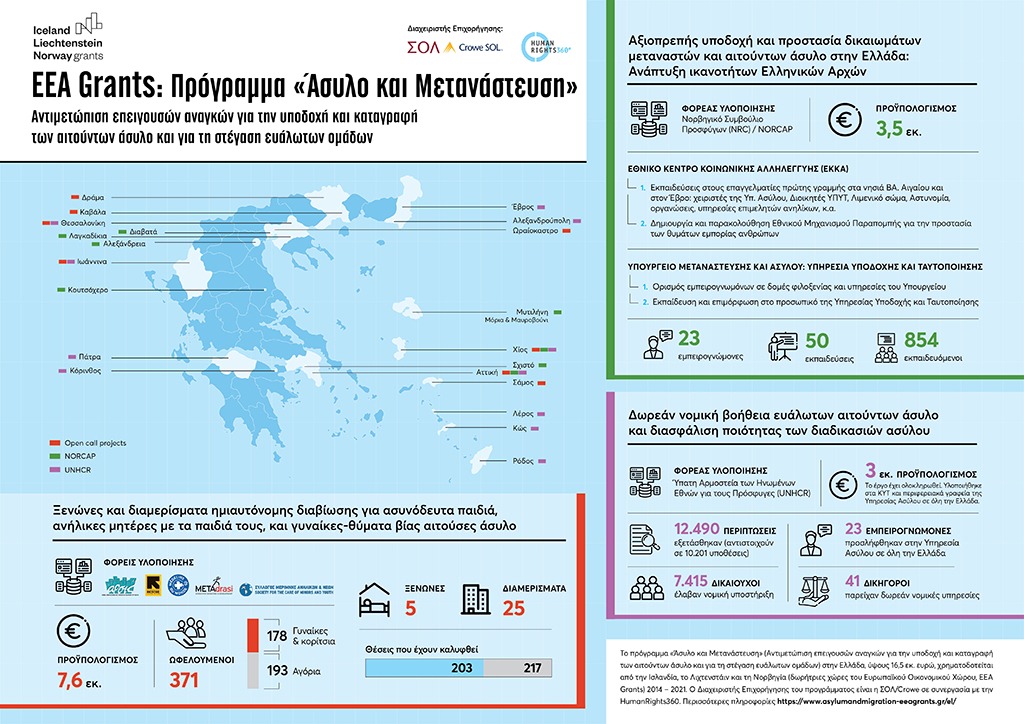In 2021, almost 8 thousand people have arrived in Greece, 4.5 thousand of them crossing the borders and 3.5 thousand by sea (1). From 2015 to date, the number of the arrivals reached 1.2 million people (2). So far, this year, 139,340 arrivals to Europe have been already recorded. 1,559 of them are missing. (3) According to the IOM’s World Migration Report 2022 (4), “the number of international migrants has grown from 84 million globally in 1970 to 281 million in 2020”. “We are witnessing a paradox not seen before in human history,” says IOM’s Director General António Vitorino. “While billions of people have been effectively grounded by COVID-19, tens of millions of others have been displaced within their own countries.” (5)
Up to now, the “Asylum and Migration” programme of the EEA Grants in Greece, has funded 5 shelters and 25 Supported Independent Living (SIL) apartments for unaccompanied minors, underage mothers with their children and women, victims of violence, asylum seekers. 371 people have been supported while 203 to 217 places are already put in use. The total funding for the shelters and the apartments amounts to 7.6 million euros. The Project Promoters, who offer accommodation and other services provided in open reception centers, are ARSIS – Association for the Social Support of Youth, International Rescue Committee (IRC), Médecins du Monde Greece, METAdrasi, and Society for the Care of Minors.
The Donor countries, Norway, Iceland, and Liechtenstein, contribute also to the dignified reception and protection of the rights of migrants and asylum seekers in Greece. To date, the project of NORCAP, with a total budget of 3.5 million euros, has demonstrated exceptional performance and remarkable results, well beyond the agreed targets: Through the support of the Reception and Identification Service (Ministry of Migration and Asylum) and the National Center for Social Solidarity (EKKA), up to now, 50 trainings to first-line professionals on islands and in Evros area (SMS advisers, RIS high-level personnel, Police, Hellenic Coast Guard etc.) and professionals of Reception and Identification Service have been successfully completed, with a total of 584 trainees. Moreover, 23 experts have been deployed in camps and Ministry services, and the National Referral Mechanism for the Protection of trafficking victims is already fully operational.
The contribution of the EEA Grants at the quality assurance of asylum procedures and the provision of free legal aid to vulnerable asylum seekers, is also remarkable.
The UNHCR project, funded with an amount of 3 million euros, achieved outstanding results: In total, the UNHCR supported the Greek Asylum Service in 12,490 instances, corresponding to 10,201 cases. The project reached 7,415 legal aid beneficiaries (asylum seekers and refugees), supporting men and women (5,022 and 2,393 respectively). This number exceeded by far the planned target of 4,500 beneficiaries, reflecting the increased need for legal aid in the areas of intervention. Last but not least, 23 experts and 41 lawyers were deployed in Asylum Service departments across Greece. The project was completed in February 2020.
The “Asylum and Migration” (Addressing urgent needs for the reception and screening of asylum seekers and for the accommodation of vulnerable groups) programme in Greece, financed by Iceland, Liechtenstein and Norway, was awarded a total budget of 16,5 million euros as part of the EEA Grants 2014 – 2021. The Fund Operator for the “Asylum and Migration” programme in Greece is SOL Consulting S.A in partnership with HumanRights360. More information: https://www.asylumandmigration-eeagrants.gr
Communications Officer:
Eleni Zacharopoulou
M. (+30) 6974206873 | E-mail: eleni.zacharopoulou@humanrights360.org
- http://data2.unhcr.org/en/situations/mediterranean/location/5179
- https://migration.iom.int/europe/arrivals
- https://migration.iom.int/europe/arrivals#content-tab-anchor
- https://worldmigrationreport.iom.int/wmr-2022-interactive/
- https://greece.iom.int/en/news/ioms-world-migration-report-shows-global-displacement-rising-despite-covid-19-mobility-limits





